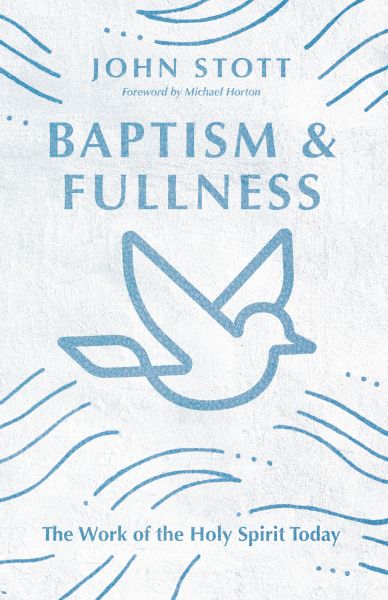Baptism and Fullness
The Work of the Holy Spirit Today
"The Christian life is life in the Spirit," writes John Stott. "It would be impossible to be a Christian, let alone to live and grow as a Christian, without the ministry of the gracious Spirit of God. All we have and are as Christians we owe to him."The Holy Spirit continues to be at work around the world, as numerous renewal movements attest. Yet much confusion and controversy remain regarding the Holy Spirit's activity. In this classic study, John Stott provides clear biblical exposition on the promise, the fruit and the gifts of the Holy Spirit. He offers particular guidance on the nature of "the baptism of the Spirit" and whether certain spiritual gifts and experiences should be normative for all Christians. Always irenic and gracious, Stott points the way to both greater biblical understanding and deeper fullness of spiritual life.
John R. W. Stott (1921-2011) has been known worldwide as a preacher, evangelist and communicator of Scripture. For many years he served as rector of All Souls Church in London, where he carried out an effective urban pastoral ministry. A leader among evangelicals in Britain, the United States and around the world, Stott was a principal framer of the landmark Lausanne Covenant (1974). His many books have sold millions of copies around the world and in dozens of languages. Stott's best-known work, Basic Christianity, has sold two million copies and has been translated into more than 60 languages. Other titles include The Cross of Christ, Understanding the Bible, The Contemporary Christian, Evangelical Truth, Issues Facing Christians Today, The Incomparable Christ, Why I Am a Christian and Through the Bible Through the Year, a daily devotional. He has also written eight volumes in The Bible Speaks Today series of New Testament expositions.Whether in the West or in the Two-Thirds World, a hallmark of Stott's ministry has been expository preaching that addresses the hearts and minds of contemporary men and women. Stott was honored by Time magazine in 2005 as one of the "100 Most Influential People in the World" and was named in the Queen?s New Years Honours list as Commander of the Order of the British Empire.In 1969, Stott founded the Langham Trust to fund scholarships for young evangelical leaders from the Majority World. He then founded the Evangelical Literature Trust, which provided books for students, pastors and theological libraries in the Majority World. These two trusts continued as independent charities until 2001, when they were joined as a single charity: the Langham Partnership. Langham's vision continues today to see churches in the Majority World equipped for mission and growing to maturity in Christ through nurturing national movements for biblical preaching, fostering the creation and distribution of evangelical literature, and enhancing evangelical theological education.
Horton (Ph.D., Wycliffe Hall, Oxford and the University of Coventry) is associate professor of historical theology at Westminster Theological Seminary in Escondido, California. He has also studied at the International Institute of Human Rights in Strasbourg and was a research fellow at Yale University. In addition, he is a past president of Christians United for Reformation, current president of the Alliance of Confessing Evangelicals, host of the White Horse Inn radio broadcast and editor of Modern Reformation Magazine. Horton's other works include Made in America: The Shaping of Modern Evangelicalism (1991), Beyond Culture Wars: Is America a Mission Field or a Battlefield? (1994), Where in the World Is the Church? A Christian View of Culture and Your Role in It (1995), We Believe: Recovering the Essentials of the Apostles' Creed (1998), A Better Way (Baker, 2002) and Covenant and Eschatology (Westminster/John Knox, 2002).
Foreword by Michael Horton
Preface to the Second Edition
Introduction
Basic Principles of Approach
1. The Promise of the Spirit
The Promise of a Distinctive Blessing
The Promise of a Universal Blessing
The Day of Pentecost
The Samaritan Believers
The Ephesian Disciples
The Language of Baptism
1 Corinthians 12:13
Conclusion
2. The Fullness of the Spirit
The Difference Between "Baptism" and "Fullness"
Continuous Appropriation
Marks of the Spirit's Fullness
The Command to Be Filled
The Average Christian
Special Experiences
An Exhortation
3. The Fruit of the Spirit
Supernatural Origin
Natural Growth
Gradual Maturity
Application
4. The Gifts of the Spirit
The Nature of Spiritual Gifts
How Many Different Gifts Are There?
The Relation Between Spiritual Gifts and Natural Talents
Are All Spiritual Gifts Miraculous Gifts?
Are All the Spiritual Gfts of the Bible Given Today?
The Word "Charismatic"
The Extent of Spiritual Gifts: To Whom Are They Given?
The Source of Spiritual Gfts: Where Do They Come From?
The Purpose of Spiritual Gifts: What are They Given For?
Conclusion
Versandkostenfreie Lieferung! (eBook-Download)
Als Sofort-Download verfügbar
- Artikel-Nr.: SW9780830884247110164
- Artikelnummer SW9780830884247110164
-
Autor
John Stott
- Mit Michael S. Horton
- Wasserzeichen ja
- Verlag IVP
- Seitenzahl 154
- Veröffentlichung 06.03.2013
- Barrierefreiheit
- ISBN 9780830884247
- Mit Michael S. Horton

